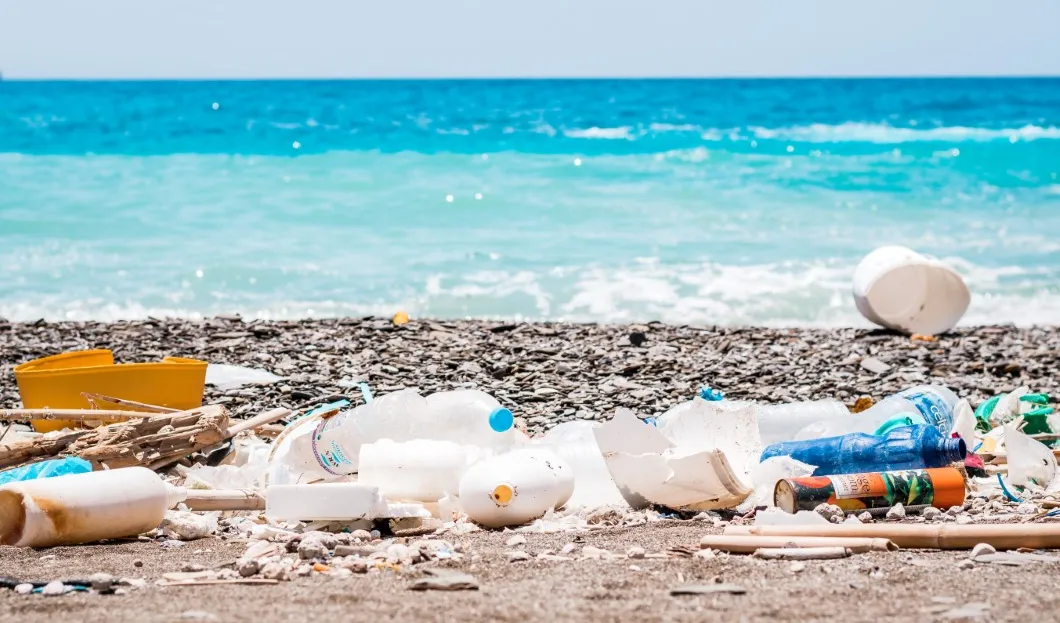
As soon as the corona pandemic banned residents and tourists from the streets of the Italian lagoon city of Venice, the canals became crystal clear and full of fish. Nature seems to recover quickly from the consequences of mass tourism. However, not all waters will be able to regenerate in such a short time.
The Mediterranean is one of the most polluted waters on earth and the coast of Venice is only one of many popular destinations on the Mediterranean. Along with the tourists comes plastic waste.
In summer, the sun rises early over the Mediterranean. The beach is still almost deserted. Only the city cleaning staff has already started with the complex cleaning. They free the fine-grained sand from bags, bottles, cans, lighters, clothes and packaging waste. But it is not only the beach that shows itself to be littered every day, but the water quality of the Mediterranean Sea is also in an alarming state.
The Mediterranean coast is densely populated. Many coastal towns do not have sewage treatment plants and instead discharge their wastewater directly into the Mediterranean. Added to this is the pollution caused by oil tankers that carry out illegal tank rinsing on the open sea. Industries and agriculture also pollute the Mediterranean with waste and toxic substances. These reach the sea via the rivers. In 2018, one of the most devastating environmental scandals on the Mediterranean occurred in the city of Gabès in south-east Tunisia. European media reported that a chemical factory there discharged radioactive and carcinogenic waste, which was produced during phosphate production, directly into the sea.
The threat posed by pollutants is proving to be extraordinarily great for the Mediterranean Sea because it is exceptionally salty and warm. It, therefore, contains little oxygen, which plays a major role in the degradation of pollutants. Furthermore, the Mediterranean has no significant ocean currents, which means that oxygen cannot reach deeper layers. Even through the narrow strait of Gibraltar, only small amounts of fresh Atlantic water circulate. Large quantities of pollutants and waste, therefore, accumulate in the Mediterranean over long periods of time. The biggest problem, however, is plastic waste.
In April 2019, a sperm whale was washed up on the Italian coast, in whose stomach 22 kilos of plastic waste was found, according to the WWF. But also, small marine animals are affected because the plastic decomposes into tiny particles in the water. Although the plastic waste shreds over the years, it is not biodegradable and can never completely dissolve. The so-called microplastics are not only absorbed by fish and turtles, but also enter the human food chain through them. It is not yet possible to predict what effects microplastics will have on human health.
Especially in the summer months, countless tourists populate the Mediterranean coast - often as many as coastal residents. The wastewater from hotels, oil pollution from motorboats and sun cream residues pollute the Mediterranean Sea. The most urgent problem, however, is the plastic waste that the tourists leave behind. In holiday resorts, the amount of plastic waste increases by up to 40 percent in the summer. Researchers report having found around 300 pieces of waste per square kilometer on the Corsican coast and in the Gulf of Lyon. Once the garbage has reached the Mediterranean Sea, it will be washed up again on the coasts within a few years, clouding the paradisiacal holiday panorama. Plastic waste comes mainly from Spain, Turkey, France, Italy, and Egypt.

Initial measures have been agreed at EU level: Of the 100 billion or so plastic bags consumed annually in the EU by 2015, according to the European Parliament, around eight billion will end up in the world's oceans. In May 2019, the EU states decided that disposable plastic, for which sustainable alternatives are available, should disappear from the market from 2021. Straws, cotton swabs and plastic dishes are among the products affected. Plastics are not only found in these products, but also in polyester clothing, cosmetic products and hygiene articles. The only way to make a difference is, therefore, general awareness and rethinking among EU citizens (the plastic industry is not the only target). This includes taking garbage as well as flip-flops, frisbee disks or whole beach shells home after a visit to the beach, as well as collecting small plastic particles such as bottle caps, cigarette butts and candy wrappers.
Ultimately, the political decisions of the EU and its member states, as well as the personal decisions of individual citizens, are therefore crucial when it comes to saving the Mediterranean. In addition to the creation of marine protected areas, the construction of wastewater treatment plants in coastal regions can also have a positive impact on water quality. Extended monitoring, control and sanctioning of oil tankers by the coast guard can also contribute to saving the Mediterranean Sea. Most important, however, is a sustainable plastic cycle in all EU Member States and the reduction of plastic consumption. Perhaps one day the Mediterranean will show itself in its natural splendor, as the canals of Venice already do today.









